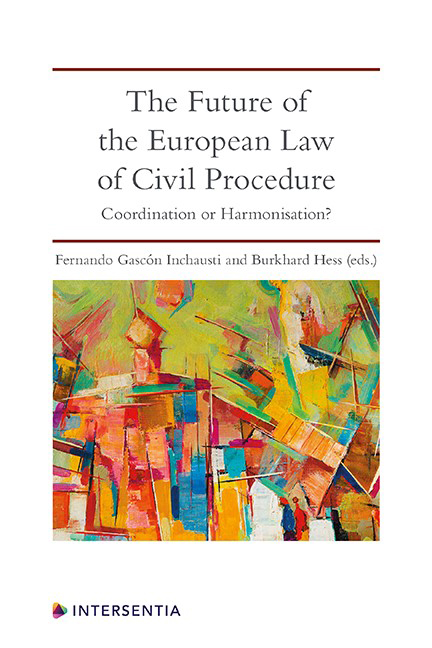Book contents
- Frontmatter
- Contents
- List of Cases
- List of Authors
- Introduction
- PART I METHODOLOGICAL APPROACHES
- PART II THE CURRENT SITUATION: VERTICAL AND HORIZONTAL HARMONISATION
- PART III CURRENT INITIATIVES FOR FURTHER HARMONISATION: The ELI/UNIDROIT Project
- The 2017 Directive Proposal on Common Minimum Standards of Civil Procedure
- Index
- ABOUT THE EDITORS
Harmonisation of the Rules on Protective Measures? The European Account Preservation Order
Published online by Cambridge University Press: 23 July 2020
- Frontmatter
- Contents
- List of Cases
- List of Authors
- Introduction
- PART I METHODOLOGICAL APPROACHES
- PART II THE CURRENT SITUATION: VERTICAL AND HORIZONTAL HARMONISATION
- PART III CURRENT INITIATIVES FOR FURTHER HARMONISATION: The ELI/UNIDROIT Project
- The 2017 Directive Proposal on Common Minimum Standards of Civil Procedure
- Index
- ABOUT THE EDITORS
Summary
Music creates order out of chaos: for rhythm imposes unanimity upon the divergent, melody imposes continuity upon the disjointed, and harmony imposes compatibility upon the incongruous.
Yehudi MenuhinI take the liberty of starting this chapter with a quote from Yehudi Menuhin, known as the Einstein of the violin, whose words about music can, in this author‘s opinion, be extrapolated to the world of European Law to approach the phenomenon of harmonisation.
In the field of law, harmonisation implies the approximation of laws to eliminate their disparities by establishing common minimum standards that affect the harmonised states operating “with equivalent rules of the game”.
Before answering the question about whether the European Account Preservation Order has contributed to the harmonisation of precautionary measures in the Union, it is necessary, in this author‘s view, to answer two preceding questions. First: are precautionary measures relevant at a cross-border level? The answer is clearly positive: in these transnational procedures it is necessary to guarantee the success of a subsequent enforcement procedure, even, if possible, with greater intensity than at the national level since they normally last longer, among other things, due to the difficulty in the practice of notifications and evidence. Bearing this in mind, the second question arises: are these measures working well within the European Union?
For years, it has been pointed out that the securing of debtors ‘funds in cross-border transactions did not sound properly and that this jeopardised the beneficial end of the enforcement of European judicial judgments. It is well known that the Brussels Regulation (in its different versions) has already dealt with cross-border protective measures in general. In fact, via articles 35 and 36, defendants’ accounts can be frozen; in particular, it was calculated in 2011 that an average of 34,000 to 36,000 cross-border account preservation orders were issued annually across Member States. But, as is well-known, for years now, after the Denilauler case, this kind of measure could only be taken after having notified the debtor. Given the special volatility of the assets affected by account preservation orders, in particular since, with online bank transfers, assets can disappear very quickly and easily with just one click of the debtor, the lack of the so-called “surprise effect” in the Brussels Regulation very oft en frustrated the effectiveness of these measures.
- Type
- Chapter
- Information
- The Future of the European Law of Civil ProcedureCoordination or Harmonisation?, pp. 111 - 122Publisher: IntersentiaPrint publication year: 2020



